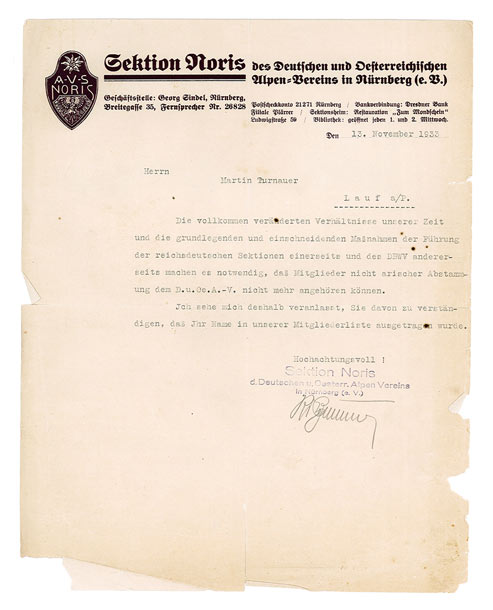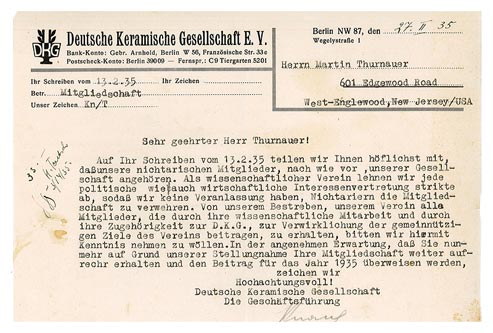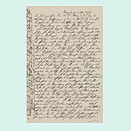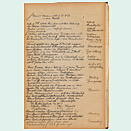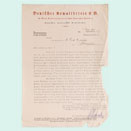Monday
13 November 1933
Expulsion of Martin Thurnauer from the Noris chapter of the German and Austrian Alpine Club
Long before 1933, anti-Semitism was firmly rooted in many quarters of the German and Austrian Alpine Club (DuöAV). Some chapters introduced Aryan Clauses as early as 1899, and the following years saw the expulsion of Jews from most of the Austrian chapters. As a result, in 1921, the Danube Region chapter was founded, which had a majority Jewish membership. However, its affiliation to the DuöAV led to a bitter debate, culminating in its debarment in 1924.
After the National Socialists took power, many members of the DuöAV actively pursued "alignment" with the new government‘s policies. However, despite these aspirations, the meeting of the club‘s steering committee in May 1933 "merely" recommended that non-Aryans no longer be accepted as new members. Nevertheless, some chapters expelled their long-standing Jewish members anyway, independently of the organization as a whole.
The Noris chapter in Nuremberg was one of these. In November 1933 it expelled its Jewish members, not as the result of a majority vote but of an executive decision by its president, Konrad Brunner, as is attested by the chapter‘s records in the archive of the German Alpine Club. During a chapter meeting on 8 November 1933, Brunner "used an opportune moment to expel the remaining Jewish members, 15 in number." Before this, "3 already emigrated without canceling their membership, another 3 canceled voluntarily and 5 expelled themselves by not paying their dues."
Five months earlier the chapter‘s steering committee had voted seven to six in a secret referendum against expelling Jewish members (while at the same time agreeing to stop accepting non-Aryans as new members). Following the adoption of the National Socialist "Leadership Principle" in the chapter‘s articles of association in late July, Brunner saw his chance and pushed through the expulsion of the existing Jewish members. Among those whose names were "removed from our membership list" was Martin Thurnauer, who would have received this letter of 13 November 1933 a few days later.
Interestingly enough, Brunner‘s action had unforeseen repercussions. Although the expulsion of the Jewish members was not retracted, the president found himself subject to "an increased antipathy" toward his person, and several administration members took a stand against adopting the Leadership Principle. In addition the chapter began having financial difficulties and problems with the leaseholder of its alpine hut. In late November 1934, forty-seven members submitted a petition for the election of a new chapter president. Konrad Brunner come up with his own explanation for what had happened: "Marxism has triumphed here; the Jew is grinning."
Aubrey Pomerance
